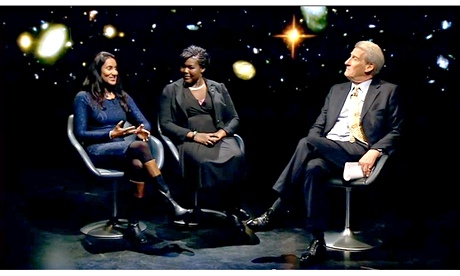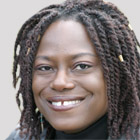Yes, Daily Mail – black and Asian women can be qualified to talk
Two scientists were challenged over their right to speak on TV. Why are our credentials called into question so often?

Dr Hiranya Peiris (left) and Dr Maggie Aderin-Pocock on Newsnight. 'As Ephraim Hardcastle reminded us, it's white men who do all this serious science stuff, not females from ethnic minorities.' Photograph: Guardian
Making assumptions about people, who they are and what they do, can be a problematic business. Those who come from old money can be famously careless about how they dress because they don't need to impress. So if you have half an eye on a news channel and there's an interviewee in a crumpled jacket and a shirt that could do with a good iron, it's probably unwise to assume it's report about the homeless; it may well be a feature on country houses.
This tendency may explain why the Daily Mail's diarist, Ephraim Hardcastle, was a little confused last week by an item on Newsnight. He clearly thought the presence of two guests, one Asian, one black and both female, must mean the viewers were being given a hard time about racism again. When it became clear that they were there to discuss the origins of the universe, the confusion deepened. As Ephraim reminded us, it's white men who do all this serious science stuff, not females from ethnic minorities. The two experts were admirably well qualified, as the Mail subsequently admitted – Dr Maggie Aderin-Pocock is an honorary research associate in the UCL's department of physics and astronomy, and Dr Hiranya Peiris is a reader in astronomy in the same institution – so why were their expertise and skills being questioned?
This syndrome of calling into question the credentials, academic and otherwise, of professionals from minority groups is pervasive and goes back over the generations. In the 1950s Caribbean migrants soon discovered that employers were unimpressed with their teaching, nursing and other qualifications, even though in those days the islands were British colonies. Many professionals ended up driving buses.
And even in contemporary Britain, there can be few black professionals who aren't familiar with this attitude. A few years ago, when I went to a school in London to do some educational consultancy, a member of staff helpfully asked me if I was looking for the kitchen. And this incident was in the multi-ethnic capital, where the PC brigade is supposed to receive education in manners.
Even when professionals from minorities do get their credentials accepted, they may still face typecasting. One black lawyer told me people tend to assume he can't wait to get his hands on discrimination cases or stick it to the white establishment in courtrooms, rather than just practise law as he was trained to do. This assumption that black people can't do anything without being "black" about it can get a little wearing.
The media, another profession tagged with the liberal label, isn't immune. News organisations tend to be happy to invite minority pundits to air their opinions on "their" subjects but are not so keen when it comes to issues that affect society as a whole. The problem with that is it does reinforce the idea that minority groups aren't really members of mainstream society and don't really care about it.
As someone who's been on several TV and radio discussion programmes, I know that, if there's a controversy in the news about race (and there usually is), it's always a good idea to keep your phone handy, as you may well get a call. If it's politics or health in the headlines, you can safely forget where you put your mobile. Many black academics, writers and politicians found themselves turning into full-time media riot correspondents in August 2011; not so many who were white did. I found myself much in demand that summer. You would have thought the obvious people to ask would have been the multicultural crowd who were rioting.
It's a natural human tendency to internalise stereotypes and make assumptions, and we're all prone to doing it. Sometimes these can be fairly harmless, and I don't suppose any members of the cabinet lose much sleep over having the upper-class twit label stuck on their tweed jackets. But making assumptions about people's qualifications and whether they have them or not is far more damaging, especially for minorities.
One final word of warning for any beggars in the neighbourhood: I dress as carelessly as any member of the aristocracy, but that doesn't mean I've got any old money – or, indeed, any new money. Please don't make assumptions.
This tendency may explain why the Daily Mail's diarist, Ephraim Hardcastle, was a little confused last week by an item on Newsnight. He clearly thought the presence of two guests, one Asian, one black and both female, must mean the viewers were being given a hard time about racism again. When it became clear that they were there to discuss the origins of the universe, the confusion deepened. As Ephraim reminded us, it's white men who do all this serious science stuff, not females from ethnic minorities. The two experts were admirably well qualified, as the Mail subsequently admitted – Dr Maggie Aderin-Pocock is an honorary research associate in the UCL's department of physics and astronomy, and Dr Hiranya Peiris is a reader in astronomy in the same institution – so why were their expertise and skills being questioned?
This syndrome of calling into question the credentials, academic and otherwise, of professionals from minority groups is pervasive and goes back over the generations. In the 1950s Caribbean migrants soon discovered that employers were unimpressed with their teaching, nursing and other qualifications, even though in those days the islands were British colonies. Many professionals ended up driving buses.
And even in contemporary Britain, there can be few black professionals who aren't familiar with this attitude. A few years ago, when I went to a school in London to do some educational consultancy, a member of staff helpfully asked me if I was looking for the kitchen. And this incident was in the multi-ethnic capital, where the PC brigade is supposed to receive education in manners.
Even when professionals from minorities do get their credentials accepted, they may still face typecasting. One black lawyer told me people tend to assume he can't wait to get his hands on discrimination cases or stick it to the white establishment in courtrooms, rather than just practise law as he was trained to do. This assumption that black people can't do anything without being "black" about it can get a little wearing.
The media, another profession tagged with the liberal label, isn't immune. News organisations tend to be happy to invite minority pundits to air their opinions on "their" subjects but are not so keen when it comes to issues that affect society as a whole. The problem with that is it does reinforce the idea that minority groups aren't really members of mainstream society and don't really care about it.
As someone who's been on several TV and radio discussion programmes, I know that, if there's a controversy in the news about race (and there usually is), it's always a good idea to keep your phone handy, as you may well get a call. If it's politics or health in the headlines, you can safely forget where you put your mobile. Many black academics, writers and politicians found themselves turning into full-time media riot correspondents in August 2011; not so many who were white did. I found myself much in demand that summer. You would have thought the obvious people to ask would have been the multicultural crowd who were rioting.
It's a natural human tendency to internalise stereotypes and make assumptions, and we're all prone to doing it. Sometimes these can be fairly harmless, and I don't suppose any members of the cabinet lose much sleep over having the upper-class twit label stuck on their tweed jackets. But making assumptions about people's qualifications and whether they have them or not is far more damaging, especially for minorities.
One final word of warning for any beggars in the neighbourhood: I dress as carelessly as any member of the aristocracy, but that doesn't mean I've got any old money – or, indeed, any new money. Please don't make assumptions.

No comments:
Post a Comment